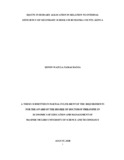| dc.contributor.author | NAMACHANJA, EDWIN WAFULA | |
| dc.date.accessioned | 2020-10-23T09:27:50Z | |
| dc.date.available | 2020-10-23T09:27:50Z | |
| dc.date.issued | 2020-08-24 | |
| dc.identifier.uri | http://r-library.mmust.ac.ke/123456789/1380 | |
| dc.description.abstract | Basic education is very critical in any education system because of the crucial role it plays in catalyzing national development. Consequently, maintaining a high student enrolment at this level should be a priority for all countries. The Constituency Bursary Fund (CBF) was established by the government of Kenya through an Act of Parliament in 2003. The purpose of this study was to investigate equity in bursary allocation in relation to internal efficiency of secondary schools in Bungoma County, Kenya. The objectives of the study were: to determine the relationship between Bursary demand and amount disbursed to secondary school students; to investigate the relationship between bursary allocation and student participation rates in secondary schools; to establish the relationship between bursary allocation and student performance in secondary schools; to determine if there is any significant difference in bursary disbursements by tuition fees charged and to determine the relationship between selected students’ characteristics and bursary allocation to secondary school students. The study was guided by Human Capital Theory. The study employed a mixed method research design. The population of the study was 206 principals from secondary schools, 9 CDF managers, 5 banks managers and 88,343 students. The sample size was 48 principals, 9 CDF managers, 5 bank managers and 883 students. The study sampled 9 CDF managers and 5 bank managers using purposive sampling and simple random sampling to select 48 principals and 883 students. Data was collected through questionnaires and document analysis. Qualitative data were analyzed through thematic narration, while quantitative data were analyzed using descriptive statistics and inferential statistics (multiple regression model and Pearson correlation). The study findings indicated that there was a strong significant relationship between Bursary amount demanded and amount received; there was a weak but significant negative relationship between bursary allocation and students’ non-attendance rates. The study concluded that as the amount of bursary allocation to recipients increased so did the students’ performance with implication that higher bursary awards enables students to remain in school and attend lessons and they are more likely to perform better. Bursary disbursements were more or less the same between male and female students. The study recommended that children of the poor echelons of the society should be assisted to access the extra-county schools through systematic measures that allow them to progress and perform well from primary schools. | en_US |
| dc.description.sponsorship | MMUST | en_US |
| dc.language.iso | en | en_US |
| dc.publisher | MMUST | en_US |
| dc.subject | Equity, Bursary, allocation, internal Efficiency. | en_US |
| dc.title | EQUITY IN BURSARY ALLOCATION IN RELATION TO INTERNAL EFFICIENCY OF SECONDARY SCHOOLS IN BUNGOMA COUNTY, KENYA | en_US |
| dc.type | Thesis | en_US |

